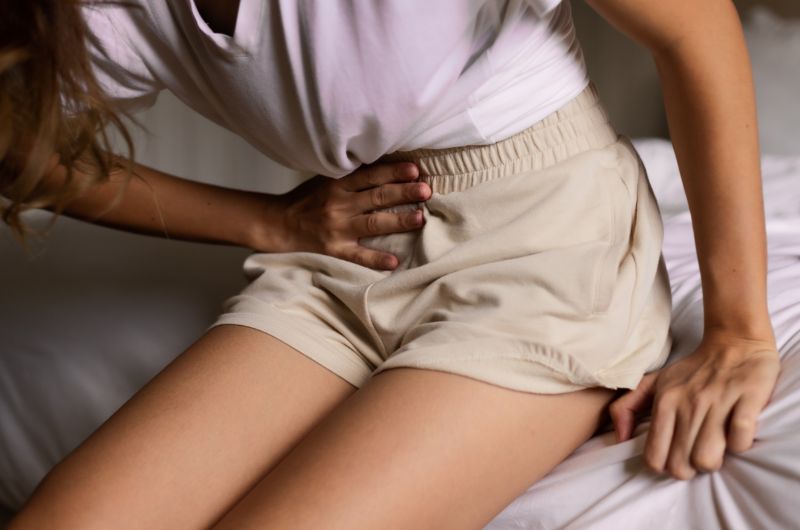Using vitamin C intravaginally could lower your risk of experiencing recurrent bacterial vaginosis symptoms. It can restore your vagina’s pH balance, regulating a healthy environment for helpful bacteria to thrive. It can also treat vaginal inflammation from your previous bouts of vaginal infection. Brown vaginal discharge after using it would usually go away when the infection finally clears up.
Women mostly worry about things going wrong after inserting what they hoped for was something that would finally clear up their BV. I know how frustrating that is!
A vaginal discharge after inserting something in your “V” isn’t only unpleasant to the eyes, it also causes you to worry. There’s no exact explanation why it occurs. What’s clear is that you’re not alone.
Let’s talk more about the benefits of vitamin C and what it offers for your vaginal health. And if a brown vaginal discharge is something you should really worry about.
Why is vitamin C an essential vitamin?

Supplying your body with enough vitamin C (also known as ascorbic acid) is important because your body can’t make nor store vitamin C.
We only get it from vitamin C-rich vegetables, fruits, and food supplements.
👉 The daily recommended amount of vitamin C for adult men is 90 mg and 75 mg for adult women.
Vitamin C helps your body produce collagen.
It’s vital in forming and maintaining your bones, cartilages, blood vessels, skin, and other bodily tissues. It also acts as an antioxidant that protects your cells and helps your immune system fight against free radicals.
Vitamin C is also vital in wound healing and iron absorption.
Because of its many benefits, vitamin C has become an essential ingredient in various beauty and skin care products.
Look at the ingredients label of the most popular and effective facial cleansers, moisturizers, masks, and serums in the market, and you’ll see one of the ingredients is vitamin C.
How does vitamin C help your vagina?
Are you wondering if vitamin C effectively treats vaginal infections like BV? Well, the answer is yes!
👉 Vitamin C is naturally acidic, and using it intravaginally may help increase your vagina’s pH level, restoring its normal flora. A healthy vagina is slightly acidic with a pH between 3.8 and 4.5. Its acidic environment prevents bacterial and yeast infections.
Many women who have suffered from recurrent BV have found relief in vitamin C vaginal tablets.
500 mg tablets of vitamin C with rosehips are the most commonly used form that usually gives you relief overnight.
Sometimes, you may want to use it regularly for several nights to be completely BV-free.

Using vitamin C intravaginally may irritate or sting your already irritated vagina. If it happens, applying vitamin E or coconut oil may help soothe the area.
Clinicians have proven to use at least 250 mg of vitamin C vaginal tablets for BV treatment.
Here’s a list of how vitamin C promotes your vaginal health:
- It lowers (or acidifies) your vaginal pH preventing the overgrowth of bacteria that cause bacterial vaginosis.
- It acts as an antioxidant that fights and clears away the free radicals produced from BV infection.
- It naturally helps your body produce collagen, which can healthily restore your vaginal lining.
- It boosts your vaginal immune cells to keep away bad bacteria.
- It helps reduce vaginal inflammation and irritation caused by the BV infection.
When using vitamin C intravaginally, you may want to avoid buffered forms as they may not be as effective as the regular acidic tablets.
Another thing to watch out for is vitamin C preparations containing binders and fillers that can harm your vagina.
What does vaginal discharge mean after inserting vitamin C?
Brown discharge after inserting vitamin C occurs commonly in women who use vitamin C as a treatment for vaginal vaginosis.
It’s usually nothing serious and will go away after a few days.
Sometimes, you may notice an orange to yellowish discharge instead of brown the day after inserting the vitamin C. It will eventually become lighter as the infection clears up.
Brown spotting could happen if you have been experiencing irregular menstrual periods.
If your BV symptoms and brown discharge don’t go away within six days of using vitamin C inserts, you should visit your trusted obstetrician-gynecologist and get tested for other possible infections.
Can vitamin C affect your period?

Have you also heard the myth that vitamin C can make your period come sooner? Delay your period or make your heavy menstrual bleeding stop?
None of these claims are backed up by strong scientific evidence.
If taking vitamin C had suddenly made your period come sooner and/or stopped your heavy menstruation, it’s more likely a mere coincidence.
Further research is still needed to prove the ability of vitamin C to affect your reproductive hormones and menstrual flow.
However, it doesn’t mean that you should care less about supplementing your diet with vitamin C. It’s worth emphasizing that vitamin C is beneficial when you’re menstruating.
Taking vitamin C will allow your body to absorb more iron from iron-rich food that you eat or supplements that you take.
It will prevent you from getting iron deficiency or anemia when you suffer from a heavy menstrual flow.
It’s also important to not exceed your vitamin C intake, especially if you’re taking birth control pills or hormone replacement therapy, as it can cause your estrogen levels to spike.
Foods and supplements that can restore your pH balance
Below are the food and supplements that can help restore your pH balance.
While adding one or more of these to your diet, some pills are available to add more benefits to your vaginal health.
1. Probiotics
Lactobacilli, the beneficial bacteria that fight off infection and regulate your vagina’s acidic environment, can be found in probiotic supplements and fermented foods.

You can add more probiotics into your diet from fermented foods and drinks like yogurt, kefir, kimchi, sauerkraut, pickles, tempeh, and kombucha.
Lactobacilli are also present in probiotic supplements and vaginal tablets, available in your local pharmacy or online.
2. Prebiotics
Foods rich in prebiotics can help stabilize your vaginal pH levels.
While probiotic-rich food and drinks supply beneficial live microorganisms to your body, prebiotics is the fiber that fuels these microorganisms to thrive.
Prebiotics are fibers that can are naturally found in:
- Legumes, beans, and peas
- Oats
- Whole wheat products
- Leeks and onions
- Asparagus and Jerusalem artichokes
- Leeks and onion
- Dandelion greens
- Berries
- Bananas
- Aloe vera, D-mannose & calcium supplements
A combination of these three in one tablet is loaded with antioxidants, vitamins, minerals, and enzymes, which can improve and regulate your vaginal pH levels and prevent and treat UTIs.
3. Cranberry juice
You might want to add cranberry juice to your daily meals. It’s rich in antioxidants that can kill harmful bacteria; and organic acids that cannot only be helpful for your vaginal health but also to your urinary tract.
What vitamins can cause vaginal discharge?
Wondering if the vitamins you’re taking are what’s causing you to have a vaginal discharge?
Below are some of the vitamins that may cause vaginal discharge.
It’s not the complete list of vitamins, but if you suspect the type you’re taking right now is causing your vaginal discharge, please see your doctor immediately.
1. Vitamin C

Vitamin C is found in various vegetables and fruits, especially citrus fruits, and is also added to food supplements. It promotes healthy bones, nerves, heart, brain, and muscles.
As mentioned above, vitamin C vaginal tablets have been studied to reduce your risk of bacterial vaginosis effectively.
Women who use vitamin C intravaginally and experienced vaginal discharge reported that it usually clears up on its own a few days to weeks until the infection clears up.
Older women in their 60s who take vitamin C for 1-6 months have also shown side effects of vaginal discharge.
There’s no clear explanation for why this happens, but please check with your doctor when you show abnormal vaginal discharge.
2. Vitamin D
Vitamin D is a well-known essential vitamin for your bones.
In addition, it can also improve vaginal health in menopausal women when taken orally or intravaginally.
Older women, especially those in their 60s, usually experience vaginal discharge after taking vitamin D.
Though vaginal discharge is normal, it’s best to seek medical advice when it’s giving you discomfort.
3. Vitamin B12
Vitamin B12 is another type of vitamin that your body cannot produce. It’s naturally found in animal products and/or available as oral supplements or injections.
Vitamin B12 is essential for your nerve and cell function, brain development, formation of your red blood cells, and DNA production.
Some women entering their menopausal ages and taking vitamin B12 may also experience vaginal discharge.
Please see your doctor immediately if you suspect the vitamin B12 supplements you’re taking have side effects.
FAQs
Can vitamins cause BV?
No, vitamins can’t cause bacterial vaginosis.
There is no known exact cause for BV, but exposure to factors that throw off your vagina’s pH balance would put you at risk for yeast and bacterial infection and sexually transmitted infections (STIs) like trichomoniasis (trich).
Can vitamins make your discharge smell?
There’s no strong evidence that vitamins can make your vaginal discharge smell. But, underlying issues could’ve given you a smelly discharge.
However, some people noticed a foul odor from their discharge from taking fish oil supplements.
Supplements and foods containing lecithin may also cause a smelly discharge.
Can vitamins change your discharge color?
Sometimes, when trying new vitamins, your discharge color could change, but it’s not always the case.
Different vaginal discharge colors could mean other things.
Can a pregnant woman take vitamin C?
Yes, pregnant or not, your body needs vitamin C every day.
During pregnancy, vitamin C will support your immune system and helps in the healthy development of your baby.
Pregnant women would need 85 mg of vitamin C and not exceeding to 2,000 mg per day.
Conclusion
Taking vitamin C is beneficial for your overall health. You must add vitamin C-rich food to your diet to ensure you get the benefits it can offer to your skin, bones, muscles, nerves, heart, and brain.
Vitamin C is also essential for your vaginal health, which could prevent you from getting a recurrent bacterial infection.
Side effects like a brown vaginal discharge could mean nothing severe and should clear up a few days after using vitamin C inserts.
Please check with your OB-GYN if you notice abnormal vaginal discharge after taking vitamin C intravaginally.


